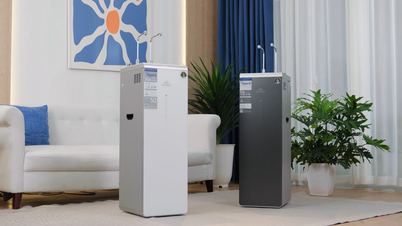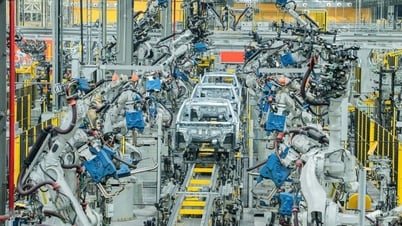However, the pain did not stop, so he went to Tam Anh General Hospital in Ho Chi Minh City for examination and discovered stage 5 kidney failure. This is the most severe level, facing the risk of acute dialysis.
On June 12, Master - Doctor Phan Duc Huu, Department of Urology, Tam Anh General Hospital said that the patient was admitted to the hospital in a state of severe, prolonged pain, fatigue, and very little urination. A healthy person can urinate from 1.5-2 liters/day, but Mr. Q. only urinated about 200 ml/day. The doctor ordered tests and a CT scan, which discovered that Mr. Q.'s left kidney was swollen and had a lot of water retention, while the right kidney had shrunk and almost lost its function. The creatinine index recorded at that time increased to 667 µmol/L (the normal index in men is 53-106 umol/L), the glomerular filtration rate was low at only 6 ml/minute/1.73 m2 (below 15 ml/minute/1.73 m2 is end-stage renal failure).
“Through CT scans, we discovered the cause of swelling, water retention, and stage 5 kidney failure, the most dangerous level in the left kidney was due to 2 stones (7mm and 6mm) stuck in the kidney, causing obstruction and preventing urine from flowing. If not intervened promptly, it will progress to chronic kidney failure, at which point the patient will have to undergo long-term dialysis,” Dr. Huu shared.
To save the patient's kidney, the medical team used retrograde endoscopy to insert a JJ catheter into the ureter to release urine from the kidney. Thanks to that, on the first day, the patient released more than 3 liters of urine, and on the second day, nearly 4 liters of urine.

Doctor examines patient during recovery
PHOTO: BVCC
Four days later, the patient recovered quickly, the creatinine index recorded 134 µmol/L, the glomerular filtration rate increased to 47 ml/min/1.73 m2 , bringing the kidney back to a safe state. When the patient was discharged from the hospital, the doctor advised the patient to pay attention to health monitoring, regular check-ups to assess kidney function. At the same time, the patient was scheduled for a follow-up visit after 2-4 weeks to perform endoscopic lithotripsy to resolve the root cause of kidney obstruction.
“The patient’s right kidney was so atrophied that it almost lost its function. We tried our best to save the remaining kidney, helping the patient escape dialysis. In the near future, the patient will continue to undergo lithotripsy and medical treatment to maintain kidney function,” said Dr. Phan Duc Huu.
Signs of healthy kidneys
Acute renal failure is a condition in which glomerular filtration rate suddenly decreases.
According to Dr. Duc Huu, acute renal failure is a condition in which the glomerular filtration rate suddenly decreases, causing electrolytes and excess waste to not be excreted. There are three groups of causes of acute renal failure, including pre-renal (volume-reducing shock such as dehydration, blood loss, cardiogenic shock, septic shock; other causes of reduced circulating volume); renal (glomerular disease and disease of small blood vessels in the kidney, renal interstitial disease, renal tubular disease); post-renal (high urinary tract obstruction such as urinary stones, blood clots, tumors; low urinary tract obstruction such as urethral obstruction, bladder neck obstruction, neurogenic bladder syndrome).
Urinary stones (kidney stones, ureteral stones, bladder stones) are a common disease in Vietnam and Southeast Asian countries. Complications of urinary stones causing urinary tract obstruction such as Mr. Q's case are one of the causes leading to acute renal failure, causing the kidney to decline or temporarily lose function. If not treated promptly, acute renal failure can progress to chronic renal failure, causing the kidney to lose its function completely, requiring renal replacement therapy with regular dialysis or kidney transplantation.
"People need to pay attention to monitoring their health and go to the hospital for examination to promptly detect if there are urinary stones in the body. They need to pay attention to high-risk factors that cause acute kidney failure such as ureteral stones, coral stones, multi-lobed stones...", the doctor noted.
Source: https://thanhnien.vn/bung-dau-cang-tuc-di-kham-phat-hien-suy-than-nang-185250612161621209.htm





























































































Comment (0)